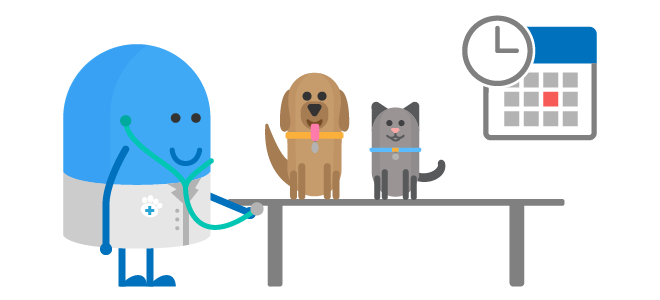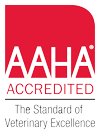Here are some answers to questions that we are frequently asked. If you have additional questions that aren’t covered here, please feel free to get in touch here.

Do I need to have an appointment?
We do take walk-ins and emergencies can come in at any point while we are open. Appointments are preferred for anything routine that can be planned ahead of time to avoid any delays.
What happens at my pet’s first appointment?
We always start with a meet and greet to get familiar with each other. We enter any previous pet medical history into our records and take care of any exams or other services needed that same day.
What is involved in the physical exam of my pet?
Our doctors will speak to you about what you’ve observed in your pet. They will check your pet’s general appearance, examining skin, eyes, ears, and teeth. They will listen to your pet’s heart and lungs, palpate the abdomen, and even measure ocular pressure if needed. Our doctors go quite a bit more in detail depending on the pet, above and beyond what most hospitals cover.
Does my pet need a physical exam before being vaccinated?
Yes. State law requires that we perform a physical exam when your pet is vaccinated with rabies. An exam also comes with our yearly update of all your pet’s vaccines. The only exception is when your pet comes in within six months of a previous exam to get a booster for boarding purposes, for instance.

How often do I have to vaccinate my pet?
Vaccinations are usually done yearly. However, that depends on what environments your pet frequents and what risks are involved. A working field dog, for instance, needs a great deal more than a purse dog. We don’t make your pet fit a prefab box. It’s a custom plan for each individual.
Should I have pet insurance?
Major medical coverage can be a great benefit to you when you need it most! If you don’t already have insurance, TruPanion Insurance is a good place to go. They are easy to work with and have great comprehensive coverage. You pick your deductible and that determines your monthly premium.
My pet isn’t sick — why does he/she need an exam every year?
On average, there are four things wrong with every pet who walks through our doors. Most weren’t “sick” either. We catch many illnesses before they make your pet sick. Pets age at a faster rate as well, which makes the yearly exam even more critical.
What is a veterinary emergency?
Two things:
- If you think it is!
- Any time a condition is either life threatening or at risk of becoming vitally unstable. Examples are acute bleeding, shortness of breath, bloat/torsion of stomach, loss of consciousness, poison ingestion, or bone fractures.
You are the most important advocate for your pet. You are the first (and best!) set of eyes to determine when emergency care is needed. The most important thing is time. Get them transported to a veterinarian quickly and safely.
Do you offer grooming?
Grooming is only here as a medical necessity, like matting that causes skin lesions. No foo foo grooming here — we concentrate on being great veterinarians!
Do you offer training classes?
No, but we do offer professional advice and can construct a training plan or refer you to a local professional.

Do you board pets?
Yes, we do. We can also administer your pet’s medications while you are away. We aren’t a fancy pet hotel, but it’s a nice, safe, and trusted place to be.
What payment options are available?
We offer Care Credit at no interest for clients who qualify.
Do you de-claw cats?
We do not, unless a rare exigent circumstance merits it. Rare as it may be, the claws may put the cat owner’s health at risk, such as a bleeding disorder. Otherwise, we will not de-claw electively. The procedure amputates the distal phalanges and is irreversible. From then on, your kitty cannot properly defend itself or flee outside up a tree or fence if needed.
When is a puppy or kitten old enough to come home with me?
Generally, 8-10 weeks is preferred to make sure they get enough time with mom.
What is the right age to have my pet spayed or neutered?
The guideline is at least four pounds or four months old. The real determining factor is a pre-procedural exam. This determines if your pet a good anesthetic candidate. Everyone gets a free physical exam before surgery.
How long to the sutures stay in after my pet’s surgery?
Sutures, if they were used, come out in 10-14 days. In many cases, we use surgical tissue glue so there is no need for suture removal.
Is it better to feed my pet dry food or wet food?
That depends, but here are some general statements that apply when there is no medical need for a prescription diet. Premium foods are best. You can avoid a lot of skin and allergy issues by using a premium diet. Dry food generally contains more nutrition per ounce than wet. Cats sometimes aren’t the best drinkers, so wet is preferred to keep more moisture in their diet. Speak to the veterinarian to find out what’s best for your pet.

How can I exercise my overweight pet?
Always consult your veterinarian for a weight reduction plan. Walk, run, play, or just interact with them. Swimming is great as it takes the weight off the joints. If not, hide kibble to make them work for it. You can get a puzzle ball for them to nuzzle around and get kibble out of.
How can I treat my my pet for fleas/ticks?
Buy reliable and warrantied products from your veterinarian. There are great top spot products and even chewables now. Over the counter grocery store products and collars are a waste of money. Collars are a ligature hazard and can be toxic to your pets. Shampoos only kill what’s on the pet with no residual effect.
What could be making my pet itchy?
There are many things that can be making your pet itchy. Pesky critters like fleas, ticks, and mites. Allergies by contact, inhalation, or food. Dry skin from all sorts, whether it’s wintery dry skin or too frequent bathing. Dog and cat skin is actually much more complex than ours, and a veterinarian needs to determine what is causing it. Otherwise, you will throw money at this left and right and chase your tail!
Do you sometimes refer pets to other veterinary professionals?
Yes. We have great diagnostics and even some special interests over and beyond general practices in our hospital. However, there are always specialists available in our area, such as internal medicine specialists, oncologists, ophthalmologists, cardiologists, and even rehabilitation facilities. We’ll direct you to the best boarded specialists in the area if needed.
 What does AAHA accreditation mean? It means your hospital holds itself to a higher standard, and that your pet is receiving care at a hospital that has passed the highest standards in veterinary care.
What does AAHA accreditation mean? It means your hospital holds itself to a higher standard, and that your pet is receiving care at a hospital that has passed the highest standards in veterinary care.